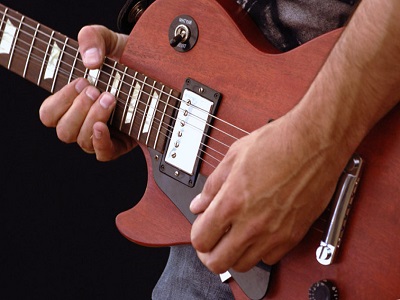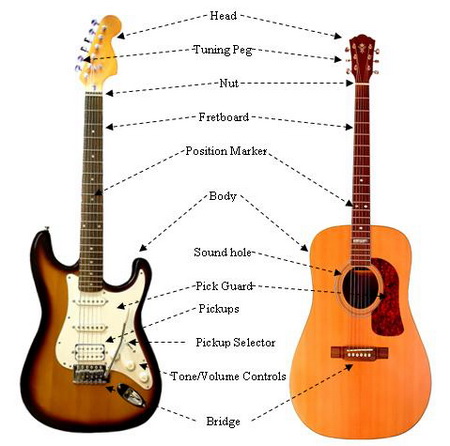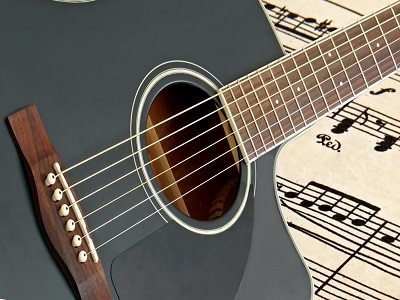7 Common Mistakes Guitar Players Make – Part 1
 Welcome to this special guitar lesson on 7 common mistakes made when learning the guitar, and how to avoid them.
Welcome to this special guitar lesson on 7 common mistakes made when learning the guitar, and how to avoid them.
I believe learning how to practice properly is a skill that is acquired over time, just like learning how to play the guitar. The more effective you can be in your practice, the faster you can learn.
This lesson details some of the most important elements of what I call “effective practice.” Put these ideas to work in your practice routine and see if you improve at a rate faster than before.
These ideas have been collected from my own experiences and through the questioning of many other top notch guitar players and colleagues of mine. In gathering this information, I was amazed at how many of these elements were consistently present.
It’s my wish that you find true value in this guitar lesson and that it helps you reach your guitar playing goals in the shortest amount of time.
1. Not Having a Goal
Or should I say not having goals. It’s been proven time and time again that the people who set goals are the most successful people in society. I’m talking about written goals. There’s something about writing down a goal that gives it extra life and power all of its own.
Why should it be any different when it comes to learning an instrument?
Pick some goals you want to achieve as a guitarist and write them down. You should also have long term goals of 5, 10, 20 years or more. Intermediate goals of a year or two. Short range goals like weekly, monthly, 6 month and a goal for each practice session.
Don’t have vague goals like “I want to get better.” Have specific goals. The more specific you can make them the better. If they aren’t specific enough how will you know when you have achieved them?
Set a goal for your next guitar practice session
To prove this makes a difference, try it out for one practice session. The next time you sit down to play your guitar, set a goal for that practice session. Be clear on what you want to accomplish in the next 45 minutes to an hour.
For example, if you are learning a new scale, your goals for the practice session could be:
• Memorize the scale
• After memorizing, play it 25 times with a metronome set at 60 BPM
• Learn 3 new guitar licks using the scale
Try the power of goal setting in your next practice session and see what it can do for you! You will realize that reaching short term goals keep you motivated.
2. Not Having A Practice Strategy
A goal is what you want to accomplish. On the other hand, a strategy is a series of steps to help you reach your goal. Having a good strategy is just as important as having a goal. An ineffective strategy would result in unnecessary time and energy spent in reaching your goals.
Now, I had identified several strategies used by top guitarists and I would like to share the most effective strategy with you. Look at the following list of numbers and try memorizing them.
149162536496481
How did you do? Can you do it? Did you try to break them up into groups of threes? Maybe you tried to organize them into a pattern like a phone number. Look at the list again like this.
1 4 9 16 25 36 49 64 81
Now do you recognize that it’s the numbers one through nine squared? We could re-write it again like this.
1² 2² 3² 4² 5² 6² 7² 8² 9²
When you put them like this they become easy to remember. In fact, you could probably Remember them for the rest of your life and not forget them. This idea is called chunking. This concept is very powerful and used by all of the top players I know.
You could apply this concept to memorizing complex patterns like scales and music theory to make the process simpler. For example, a two octave scale on the guitar could have up to 18 notes in one position. If you try memorizing all 18 notes at once, it would be quite a massive challenge.
Chunking Helps Break Up Complicated Information
Using the idea of chunking, you could start with just the first 4 notes. When you have those memorized, add on two more and then play all 6 notes in the scale. When you have that nailed, add on two more notes and continue until you have the entire scale memorized.
Chunking is very powerful. It’s like the old joke, how do you eat an elephant? One bite at a time. Apply chunking as a strategy to your guitar practice routine and watch your efficiency improve by leaps and bounds.
For more tips to supercharge your practice and learning, check out Part 2 the article here…
Everything You Need to Become a Great Guitar Player…
For the most comprehensive step-by-step guitar training program, we highly recommend Gibon’s Learn & Master Guitar course. This award winning DVD course is currently having a 3-day sale and you get to save $100 off the usual price today!
Click here to find out more information and get the course before this promotion ends…







Leave A Comment